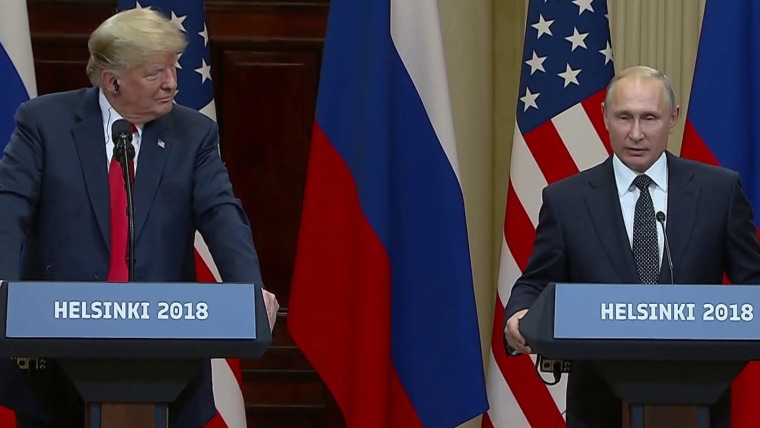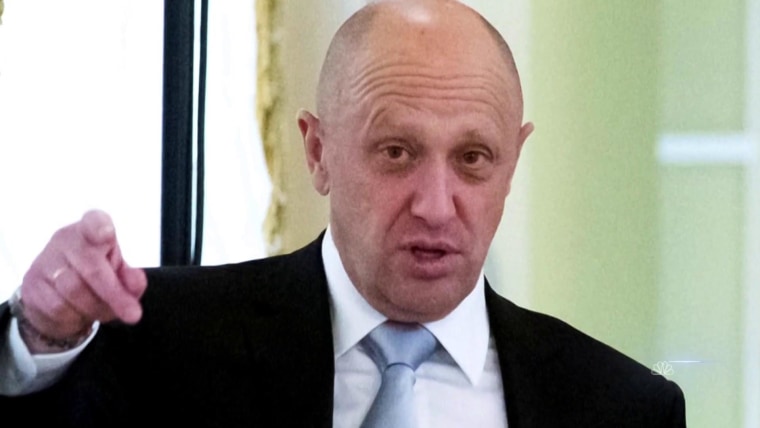WASHINGTON — Congressional Democrats and former intelligence officials have expressed skepticism about the Justice Department’s decision to drop a criminal prosecution of Russian companies accused of interfering with the 2016 U.S. election, while a lawyer for the defendants says the case never should have been brought.
Citing “a risk of exposure of law enforcement’s tools and techniques,” the Justice Department on Monday moved to dismiss the prosecution — on the eve of trial — of two Russian firms linked to Yevgeny Prigozhin, a St. Petersburg businessman known as “Putin’s chef.” The case by former special counsel Robert Mueller accused the firms of sponsoring a vast campaign of social manipulation designed to sow chaos and boost then-Republican candidate Donald Trump.
The indictment, based in part on declassified intelligence information, detailed the activities of an internet troll farm called the Internet Research Agency, where Russians sitting in a St. Petersburg office building impersonated Americans on social media.
The charges against 13 individual Russians named in the indictment will stand, Justice Department officials said, although none of them are in custody.
Federal prosecutors said the decision to drop the case was based in part on an undisclosed “change in the balance of the government’s proof due to a classification determination,” according to a nine-page filing bolstered by more documents that are sealed and therefore hidden from the public.
Eric Dubelier, the former federal prosecutor who represented defendant Concord Management, alleged that the government dropped the prosecution simply because it feared it would lose the case.
“The idea that it had to protect classified information simply isn’t convincing,” he told NBC News. “The government told the judge at the outset of this case that it could be prosecuted with no classified evidence whatsoever. I think the prosecutors were simply convinced at the time they filed this case that no one would show up to defend it.”
Marc Raimondi, a spokesman for the Justice Department’s National Security Division, said Concord Management “was making a mockery of our legal system and had no intention of providing the materials the court asked for. They have sought to weaponize the discovery process.”
DOJ attorneys involved in the case, he said, reached the decision by evaluating “the risk versus the reward. Who are you going to hold accountable? They have nobody except an outside attorney. So what are you getting in return for all of this information that we’re providing that details how we conduct investigations into foreign interference?”
Raimondi also noted that the entire case was not dismissed. “Nothing has changed for the dozen individuals who were also indicted. Our intention is to see them in court somebody. Maybe one of them will travel and we’ll get them.”
Let our news meet your inbox. The news and stories that matters, delivered weekday mornings.
The top Democrat on the Senate Intelligence Committee expressed frustration over the Justice Department’s move, while some former intelligence officials and legal experts are voicing skepticism.
“It’s extremely disturbing that we have reached this point, Sen. Mark Warner of Virginia, ranking Democrat on the committee, told NBC News. “People, and companies that interfere in our elections should ideally be prosecuted to the fullest extent of the law.”
At the same time, Warner added, “the U.S. has to protect sources and methods and make sure that foreign defendants aren’t using our constitutional process to hurt our national security. If DOJ cannot prosecute Concord, the IRA, and Prigozhin, the administration needs to find other tools to pursue them and stop their activities.”
“I don’t buy it,” tweeted Marc Polymeropoulos, a former CIA officer who worked on the assessment of Russian election interference that was partially released to the public. “DOJ does this all the time with CIA info. There’s a process for this. Something smells…”
“This is highly irregular,” said Barbara McQuade, a former federal prosecutor. “These decisions are made before indictment.”
The top Democrat on the House Intelligence Committee, California’s Adam Schiff, said the DOJ’s decision to drop the case “is impossible to evaluate without examining what the DOJ would be forced to disclose in discovery. … If important sources and methods are truly implicated, that would be the right decision.
“At the same time, the President’s Twitter-gloating over the dismissal and Attorney General Barr’s sublimation of the Department to Trump’s narrow political interests raises the usual questions of what is really motivating this change of course.”
In their filing, prosecutors accused Concord of using the legal process to expose, for the benefit of the Russian government, how the United States combats foreign election interference. Meanwhile, they said, Concord failed to comply with subpoenas and Prigozhin himself refused to show up in court.
“There is a substantial federal interest in defending American democratic institutions, exposing those who endeavor to criminally interfere with them, and holding them accountable, which is why this prosecution was properly commenced in the first place,” prosecutors wrote. “In light of the defendant’s conduct, however, its ephemeral presence and immunity to just punishment, the risk of exposure of law enforcement’s tools and techniques, and the post-indictment change in the proof available at trial, the balance of equities has shifted. It is no longer in the best interests of justice or the country’s national security to continue this prosecution.”
Dubelier, the lawyer for the Russian defendants, said, “No matter what the government says in its court filing, the fact is they lost and we won. This case was nothing more than a political statement from the beginning.”
Dubelier said the Mueller team “grossly overstated” the amount of money that was spent by the Russian entity and the number of social media influence ads that were actually purchased.
The total amount of the ads in U.S. dollars that would have to be reported under federal rules, he said, was no more than $2500.
“The prosecution lacked evidence to prove that the defendants knew what they were doing violated complex U.S. election laws,” he said. The ads were purchased using a Russian name, a Russian Internet address, and paid for in rubles.
“Facebook knew all of that and did nothing about it,” he said. Facebook has since banned the purchase of political ads by foreigners targeting an American audience.
Dubelier rejected the notion that the Russians carried out an unusually aggressive social media campaign to influence the U.S. election. “It was nothing different than what the United States has done in every foreign election since World War II,” he said.
The U.S. intelligence community, Congressional intelligence committees and many private researchers disagree. A Senate report on Russian election interference devotes more than 45 pages to the activities of the Internet Research Agency, documenting a significant impact on the 2016 presidential election.
Facebook itself said Russian propaganda, much of it from the IRA, reached as many as 126 million people. NBC News reported on a study by researchers at the University of Tennessee showing that Trump’s gains in popularity during the 2016 campaign correlated closely with high levels of social media activity by the Russian trolls and bots of the Internet Research Agency.
“Russian meddling in the 2016 U.S. Presidential election is likely to be seen by the Kremlin as a major success,” Eugene Rumer, director of the Russia and Eurasia Program at the Carnegie Endowment for International Peace told the Senate Intelligence Committee.













